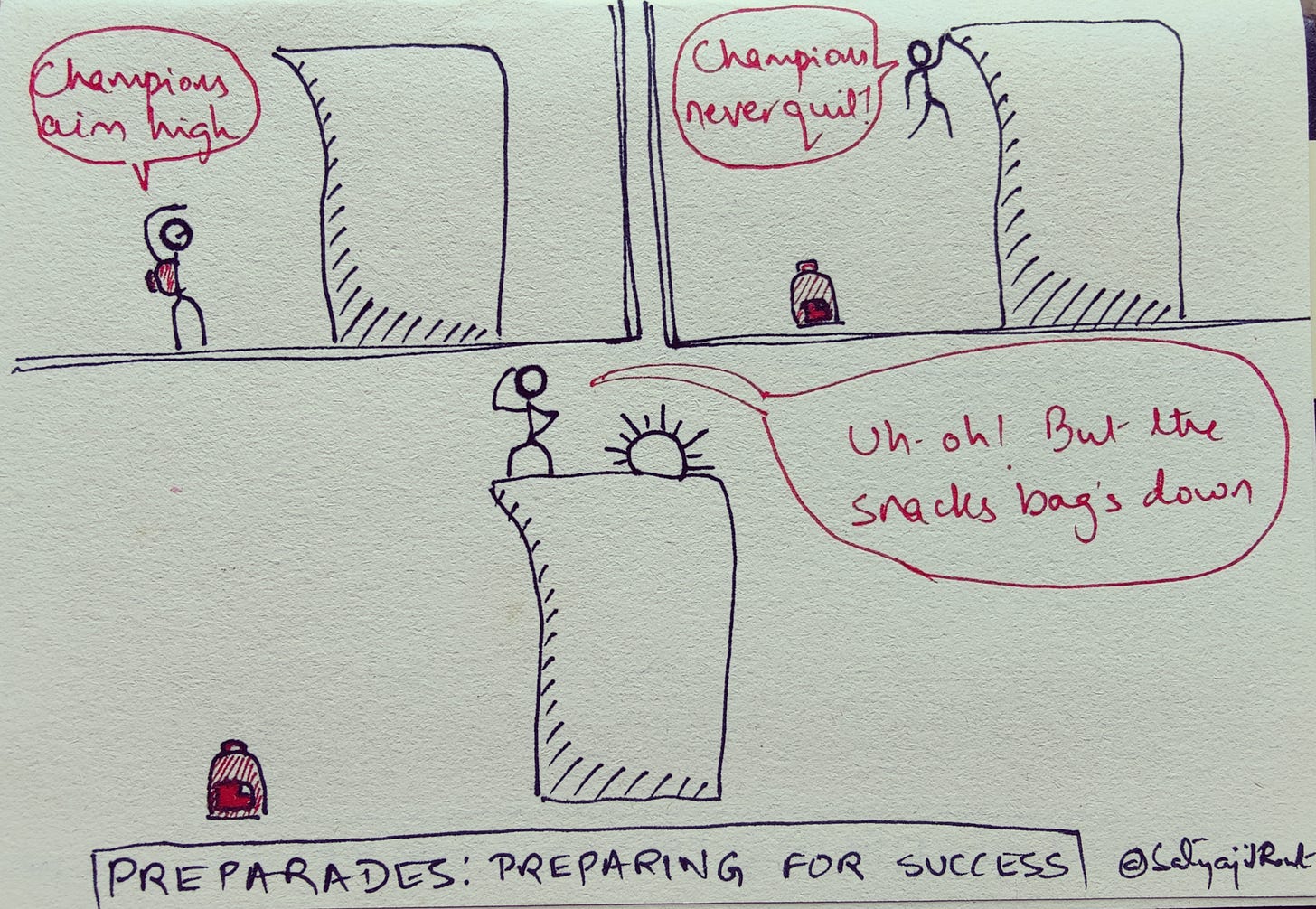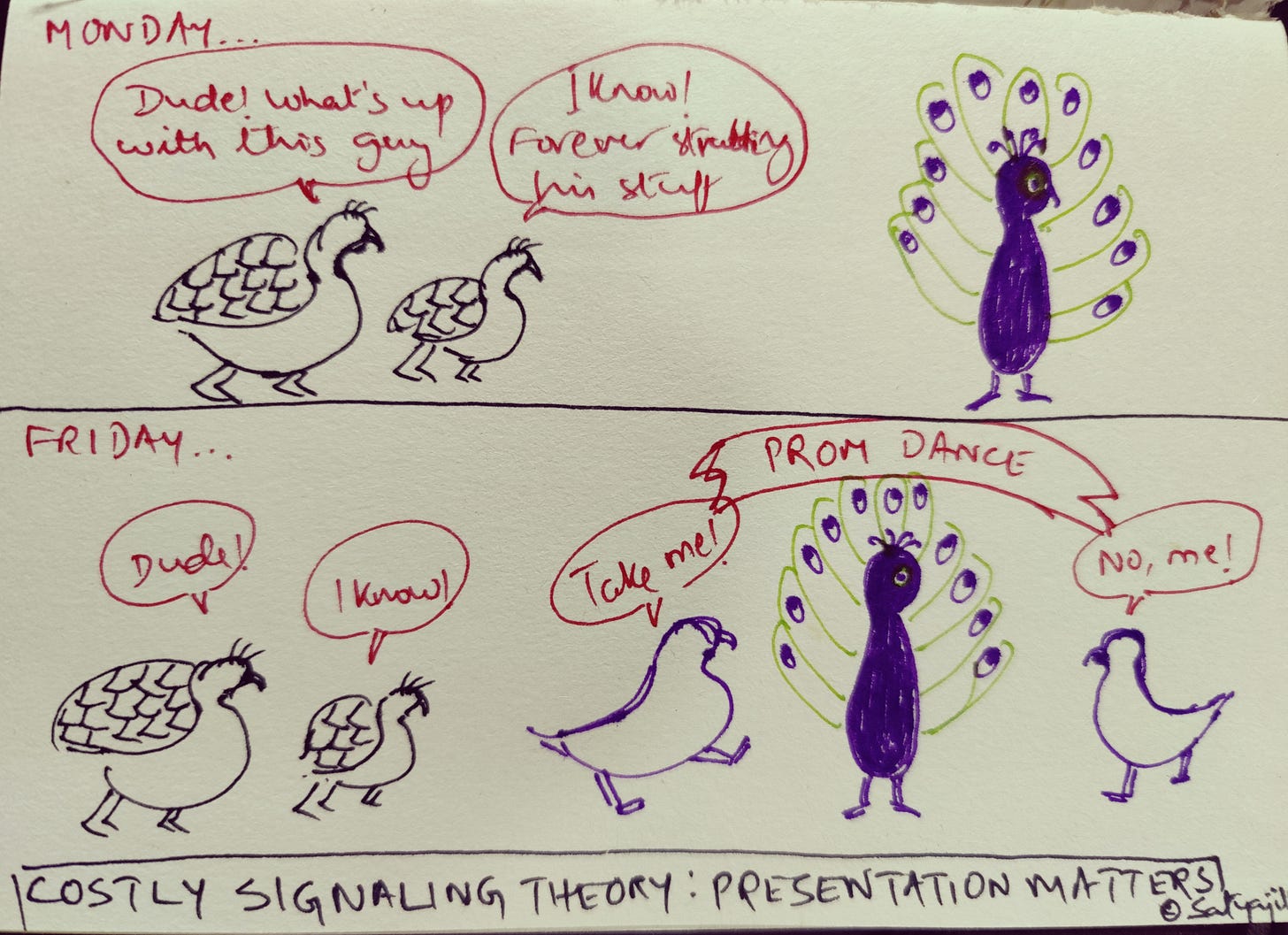#48 Deal with success or have it eat you up
Plus: why signaling matters and why doctors take so long to build a reputation
Hi friends! 👋👋
Welcome to Issue #48 of Curiosity > Certainty!
Last week, I received a pleasant surprise. A shout-out from a fellow creator on his newsletter. Stay Curious stands out for its fantastic curation. Pritesh has always been a curious cat and it shows in the stuff he consumes and shares. It is super eclectic and you will invariably find something you’ll fondly remember with an ‘Aha!’ three weeks later as you’re sipping coffee by the window. I’ve made several serendipitous discoveries in my weekly reads of Stay Curious: Wait but Why, Kevin Kelly, and hidden essay-gems from Paul Graham. Give it a try. You’ll be hooked! And here’s the piece with the profile of me, if you’re interested.
On to this week then…
Imagining success is not overconfidence
It may seem odd to worry about a positive outcome, but that’s exactly what you need to do to avoid being snowed under.
You avoid the worst-case scenario by asking about any decision: What happens if it turns out poorly? You can also ask the obverse: What happens if it turns out well? Success brings opportunities that quickly become challenges if you aren’t prepared to cash in.
𝐈𝐧 𝐝𝐞𝐜𝐢𝐬𝐢𝐨𝐧-𝐦𝐚𝐤𝐢𝐧𝐠, 𝐚 𝐩𝐫𝐞𝐩𝐚𝐫𝐚𝐝𝐞 𝐚𝐬𝐤𝐬 𝐲𝐨𝐮 𝐭𝐨 𝐢𝐦𝐚𝐠𝐢𝐧𝐞 𝐲𝐨𝐮𝐫 𝐜𝐞𝐥𝐞𝐛𝐫𝐚𝐭𝐢𝐨𝐧 𝐩𝐚𝐫𝐚𝐝𝐞 𝐚𝐧𝐝 𝐩𝐥𝐚𝐧 𝐟𝐨𝐫 𝐢𝐭. 𝘐𝘮𝘢𝘨𝘪𝘯𝘦 𝘪𝘵’𝘴 𝘢 𝘺𝘦𝘢𝘳 𝘧𝘳𝘰𝘮 𝘵𝘰𝘥𝘢𝘺 𝘢𝘯𝘥 𝘵𝘩𝘦 𝘥𝘦𝘤𝘪𝘴𝘪𝘰𝘯 𝘩𝘢𝘴 𝘣𝘦𝘦𝘯 𝘢 𝘸𝘪𝘭𝘥 𝘴𝘶𝘤𝘤𝘦𝘴𝘴. 𝘏𝘰𝘸 𝘥𝘰 𝘺𝘰𝘶 𝘦𝘯𝘴𝘶𝘳𝘦 𝘺𝘰𝘶’𝘳𝘦 𝘳𝘦𝘢𝘥𝘺 𝘧𝘰𝘳 𝘵𝘩𝘢𝘵 𝘵𝘪𝘮𝘦? 🤞
For a solopreneur, it may be thinking beyond the product to the distribution and administrative overheads. 🚚
For a breakout pop star, it may be about having a strong support system that shields her from outside noise. 🙌
For a tech startup, it may be about building scalable processes and hiring the right talent so that founders can stay focused on the long term without fire-fighting all the time. 📈
𝐀 𝐜𝐨𝐦𝐦𝐨𝐧 𝐦𝐢𝐬𝐭𝐚𝐤𝐞 𝐢𝐬 𝐭𝐨 𝐭𝐡𝐢𝐧𝐤 𝐨𝐟 𝐭𝐡𝐞 𝐟𝐮𝐭𝐮𝐫𝐞 𝐚𝐬 𝐚 𝐬𝐢𝐧𝐠𝐥𝐞 𝐬𝐜𝐞𝐧𝐚𝐫𝐢𝐨 𝐭𝐡𝐚𝐭 𝐰𝐞 𝐦𝐮𝐬𝐭 𝐭𝐫𝐲 𝐚𝐧𝐝 𝐩𝐫𝐞𝐝𝐢𝐜𝐭 𝐫𝐢𝐠𝐡𝐭. Instead, as the book 𝘋𝘦𝘤𝘪𝘴𝘪𝘷𝘦 suggests, we could imagine the future as a range of possibilities bookended by total failure and roaring success. And not just plan to avoid failure but also ready ourselves for success.
Imagining a successful future is not overconfidence. Believing that you can precisely predict the future to a point is. Just as a premortem insures us against adversity, a preparade lets us cash in on our Oprah moment and build on breakthroughs that turn to lasting successes.
What you signal matters
My mum-in-law is a fantastic cook but she doesn’t understand 𝐜𝐨𝐬𝐭𝐥𝐲 𝐬𝐢𝐠𝐧𝐚𝐥𝐢𝐧𝐠 𝐭𝐡𝐞𝐨𝐫𝐲. Her dishes are yummy but presented like a peasant’s.
To bees, a plant that can produce bright petals and fragrant scent has enough nectar. To a peahen, a peacock that can bear the extravagance of a dazzling tail has good genes. To a gourmand, a chef that puts detail in the presentation is worth going out of her way for.
Plants, peacocks, and chefs understand that 𝐢𝐭 𝐢𝐬 𝐡𝐚𝐫𝐝 𝐭𝐨 𝐩𝐮𝐭 𝐢𝐧 𝐭𝐡𝐞 𝐭𝐢𝐦𝐞 𝐚𝐧𝐝 𝐞𝐟𝐟𝐨𝐫𝐭 𝐭𝐨 𝐣𝐮𝐝𝐠𝐞 𝐞𝐯𝐞𝐫𝐲 𝐭𝐡𝐢𝐧𝐠 𝐟𝐨𝐫 𝐰𝐡𝐚𝐭 𝐢𝐭 𝐭𝐫𝐮𝐥𝐲 𝐢𝐬. It is impossible.
Rory Sutherland in his wonderful book 𝘈𝘭𝘤𝘩𝘦𝘮𝘺 says that 𝐭𝐡𝐞 𝐪𝐮𝐚𝐥𝐢𝐭𝐲 𝐨𝐟 𝐭𝐡𝐞 𝐦𝐞𝐬𝐬𝐚𝐠𝐞 𝐢𝐬 𝐚 𝐟𝐮𝐧𝐜𝐭𝐢𝐨𝐧 𝐨𝐟 𝐡𝐨𝐰 𝐝𝐢𝐟𝐟𝐢𝐜𝐮𝐥𝐭 𝐢𝐭 𝐢𝐬 𝐭𝐨 𝐜𝐫𝐞𝐚𝐭𝐞 𝐚𝐧𝐝 𝐭𝐫𝐚𝐧𝐬𝐦𝐢𝐭 𝐢𝐭. That’s costly signaling theory. Be it extravagant biological displays or top-of-the-line advertising, the perception of high value comes from high cost.
Think of what celebrity endorsements signal. On the surface, they signal aspirational appeal. Amitabh Bachchan is unlikely to be caught riding a scooter but the brand he endorses benefits from a positive association with his superstar status. But there’s another thing at play. A brand that can afford Amitabh Bachchan has deep pockets. It is in good health. It is that peacock that can bear the weight of its heavy plumage.
My mum-in-law is not alone. Most ‘rational’ thinkers would agree with her. Proof is in the pudding, not in its packaging.
If you’ve ever wondered who responds to public service ads that look like relics from the past, or why brand marketing and thought leadership can be such hard sells internally, or how a safe graveyard for good ideas is poorly structured PPTs, you understand the value of signaling.
‘I Don’t Trust Young Doctors’ Framework
If you’re young and debating which career to pursue, remember that your choice will also decide how fast you’ll learn, how well you’ll learn, and your attitude toward failure and success for the next several decades. Even if you’ve made this consequential decision of your life, you may find something of value in the framework I propose.
👉Picture a 2X2 matrix with validity (low to high) and feedback (poor to rich) as the axes. Validity indicates the ease of measurement and richness of feedback is how quick and clean it comes.
In the top right is the high validity-rich feedback quadrant. You’ll find here firefighters, pilots, sportsmen, cooks, nurses, electricians, carpenters, social media writers. Errors are easy to track. If you ask this lot what works, they may say it depends and then go on to list exactly what.
The bottom left quadrant covers the low validity-poor feedback professions: doctors, knowledge workers, admissions officers, radiologists, novel writers. Their assumptions often remain untested and they tend to use hindsight to reinforce their thinking. Their expertise is shrouded in mystery. If you ask them what works, they may say it’s complicated.
Funnily enough, those in the bottom left may put a big price on experience even though tracking errors and improving performance are hard. So they simply equate experience with expertise. We’ve all broken a cold sweat while being under the charge of a doctor who looked too young.
Think of the constraints under which a doctor tracks the quality of her intervention. She can’t run any test she wants, she has to base her opinion on the patient’s ability to articulate the problem, and it is hard to track the patient beyond clinic visits.
Now think of how outcomes are tracked in an organization. Be it an M&A or a market entry, you decide with incomplete information and receive noisy and delayed feedback. It may be months before the results are seen. Even then, it’s hard to say for sure what caused what. There are too many variables outside your control.
What happens then? Contradictory data tends to get ignored; confirmatory data, accepted.
As the book 𝘉𝘭𝘢𝘤𝘬 𝘉𝘰𝘹 𝘛𝘩𝘪𝘯𝘬𝘪𝘯𝘨 says, 𝐭𝐡𝐞 𝐩𝐚𝐫𝐚𝐝𝐨𝐱 𝐨𝐟 𝐬𝐮𝐜𝐜𝐞𝐬𝐬 𝐢𝐬 𝐭𝐡𝐚𝐭 𝐢𝐭 𝐢𝐬 𝐛𝐮𝐢𝐥𝐭 𝐨𝐧 𝐟𝐚𝐢𝐥𝐮𝐫𝐞. But in some professions you may not have ready access to the error signal. If you’re in one, stop believing the larger-than-life personas of those successful in your domain. And instead think about how you’re tracking your improvement across time. Are you using hindsight to reinforce your thinking or are you being honest about your mistakes?
***
That’s it for this week. Thanks for reading! 🙏
Tell me how I can make this newsletter better for you. Spread some ❤ by sharing it with a friend or two.
Until next week (when I may have some big news!)…






